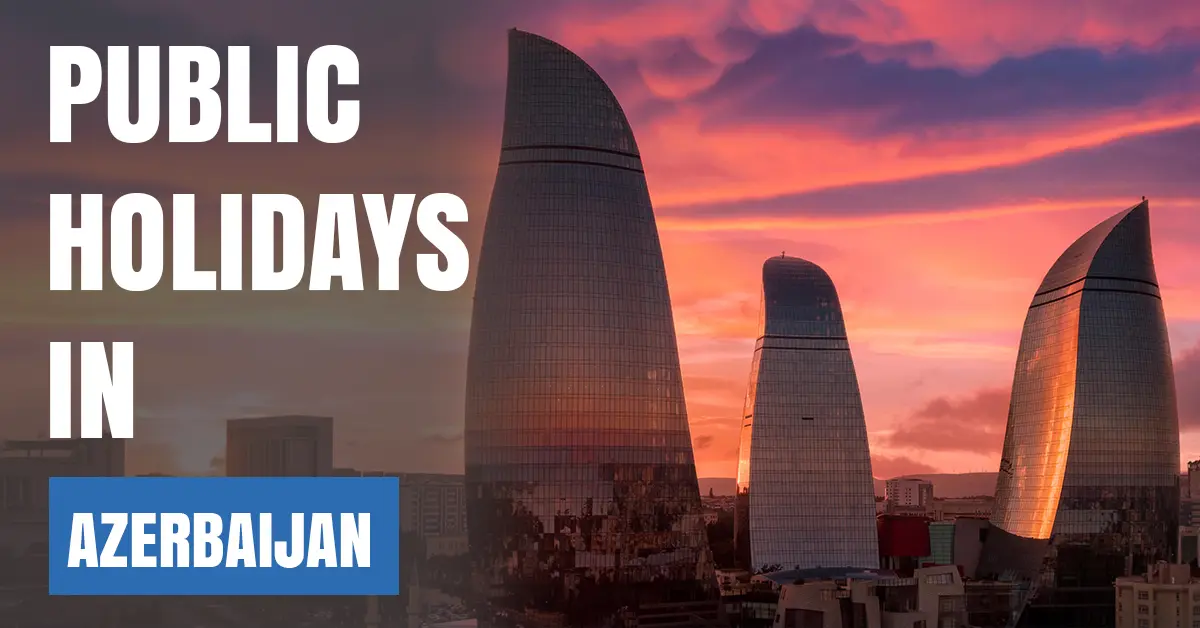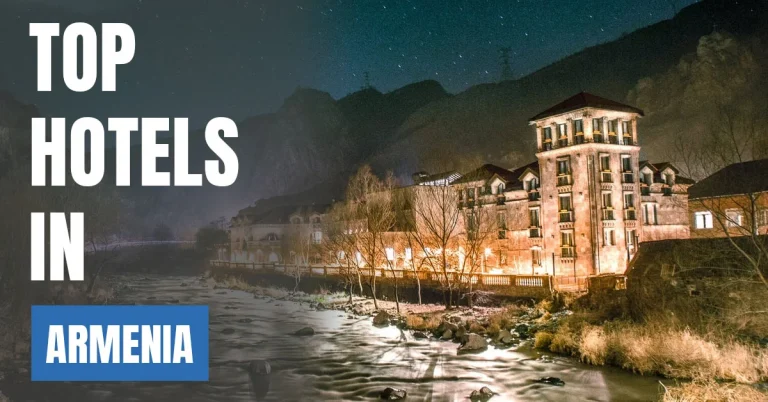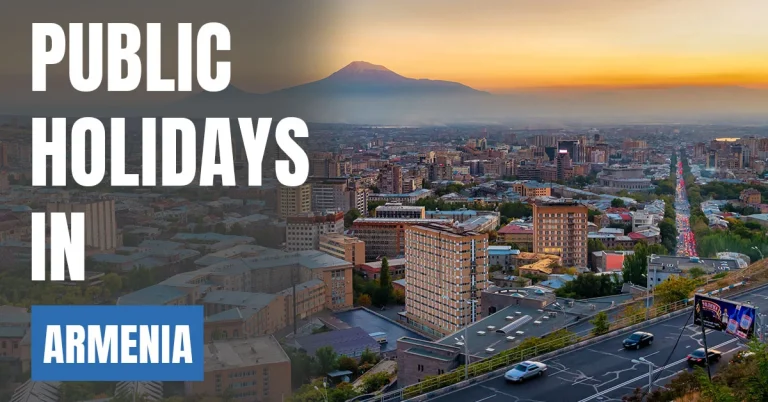Public Holidays in Azerbaijan 2026 – Islamic, National & Public Days

Azerbaijan observes a diverse range of public holidays that reflect its rich cultural history, Islamic traditions, and national independence. These holidays commemorate major historical events and religious occasions celebrated across the country.
Overview of Public Holidays in Azerbaijan
Public holidays in Azerbaijan include national commemorations and religious observances based on the Islamic lunar calendar. The country celebrates its independence, military victories, and cultural unity through national holidays, while religious festivals like Ramadan Bayram and Gurban Bayram highlight Azerbaijan’s Islamic heritage.
List of Public Holidays in Azerbaijan (2026)
| Holiday | Date (2026) | Day | Significance |
|---|---|---|---|
| New Year’s Holiday | January 1–2 | Thursday–Friday | Welcomes the new year with family gatherings and celebrations. |
| International Women’s Day | March 8 | Sunday | Honors the role and contributions of women in society. |
| Novruz Bayram | March 20–24 | Friday–Tuesday | Traditional spring festival marking the Persian New Year. |
| Victory Day over Fascism | May 9 | Saturday | Commemorates victory in World War II. |
| Republic Day | May 28 | Thursday | Marks the founding of the Azerbaijan Democratic Republic in 1918. |
| National Salvation Day | June 15 | Monday | Honors the political return of Heydar Aliyev in 1993. |
| Armed Forces Day | June 26 | Friday | Celebrates the formation of the Azerbaijani Armed Forces. |
| Gurban Bayram (Eid al-Adha) | May 27–28* | Wednesday–Thursday* | Islamic festival of sacrifice commemorating Prophet Ibrahim. |
| State Independence Day | October 18 | Sunday | Marks Azerbaijan’s declaration of independence from the USSR. |
| Victory Day in the Patriotic War | November 8 | Sunday | Commemorates victory in the 2020 Karabakh conflict. |
| Constitution Day | November 12 | Thursday | Marks adoption of Azerbaijan’s Constitution in 1995. |
| National Revival Day | November 17 | Tuesday | Honors the 1988 national revival movement for independence. |
| World Azerbaijanis Solidarity Day | December 31 | Thursday | Celebrates unity among Azerbaijanis worldwide. |
*Islamic dates depend on moon sighting.
List of Public Holidays in Azerbaijan (2025)
| Holiday | Date (2025) | Day | Significance |
|---|---|---|---|
| New Year’s Day | January 1–2 | Wednesday–Thursday | Celebrates the beginning of the new year with family and fireworks. |
| International Women’s Day | March 8 | Saturday | Honors women’s contributions in Azerbaijani society. |
| Novruz Bayram (Nowruz Festival) | March 20–24 | Thursday–Monday | Marks the Persian New Year and arrival of spring, celebrated with fire-jumping and feasts. |
| Victory Day over Fascism | May 9 | Friday | Commemorates victory in World War II and honors Azerbaijani veterans. |
| Republic Day | May 28 | Wednesday | Celebrates the establishment of the Democratic Republic of Azerbaijan in 1918. |
| National Salvation Day | June 15 | Sunday | Marks the return of Heydar Aliyev to power in 1993, ensuring national stability. |
| Armed Forces Day | June 26 | Thursday | Honors the formation of Azerbaijan’s National Army in 1918. |
| Gurban Bayram (Eid al-Adha) | June 6–7* | Friday–Saturday* | Islamic festival commemorating Prophet Ibrahim’s devotion and sacrifice. |
| State Independence Day | October 18 | Saturday | Marks the restoration of Azerbaijan’s independence from the Soviet Union in 1991. |
| Victory Day in the Patriotic War | November 8 | Saturday | Commemorates Azerbaijan’s military victory in the 2020 Nagorno-Karabakh conflict. |
| Constitution Day | November 12 | Wednesday | Marks the adoption of Azerbaijan’s Constitution in 1995. |
| National Revival Day | November 17 | Monday | Honors the national revival movement for freedom and independence in 1988. |
| World Azerbaijanis Solidarity Day | December 31 | Wednesday | Celebrates unity among Azerbaijani communities worldwide. |
*Islamic dates are approximate and depend on lunar calendar observations.
Religious and Cultural Significance
Azerbaijan’s holidays reflect both Islamic faith and national pride. Novruz Bayram, a UNESCO-recognized cultural heritage festival, is one of the most important celebrations, symbolizing renewal and harmony. Gurban Bayram and Ramadan Bayram emphasize charity, family unity, and devotion. Secular holidays such as Republic Day and Victory Day honor Azerbaijan’s resilience and independence.
Public Observances and Closures
On official holidays, government offices, schools, and most private institutions are closed. In cities like Baku and Ganja, festive markets, concerts, and fireworks light up the streets during major celebrations like Novruz. Some national holidays are extended to create long weekends for citizens to travel and spend time with family.
Frequently Asked Questions (FAQs)
How many public holidays does Azerbaijan have?
Azerbaijan has around 15 public holidays annually, including national, cultural, and religious observances.
What is the most important holiday in Azerbaijan?
Novruz Bayram is the most celebrated holiday in Azerbaijan, marking the Persian New Year and arrival of spring.
Does Azerbaijan celebrate Islamic holidays?
Yes. Azerbaijan celebrates Gurban Bayram (Eid al-Adha) and Ramadan Bayram (Eid al-Fitr) as official public holidays.
Are businesses closed during public holidays?
Yes, most public offices and schools close during official holidays, though some restaurants and tourist services remain open in major cities.
Conclusion
Public holidays in Azerbaijan showcase the nation’s deep cultural roots and patriotic pride. From the lively traditions of Novruz to solemn days of remembrance, these holidays bring communities together in faith, unity, and celebration of national identity.
Also Explore: Public Holidays in Austria





